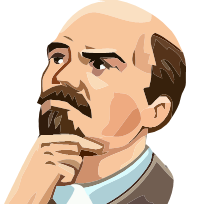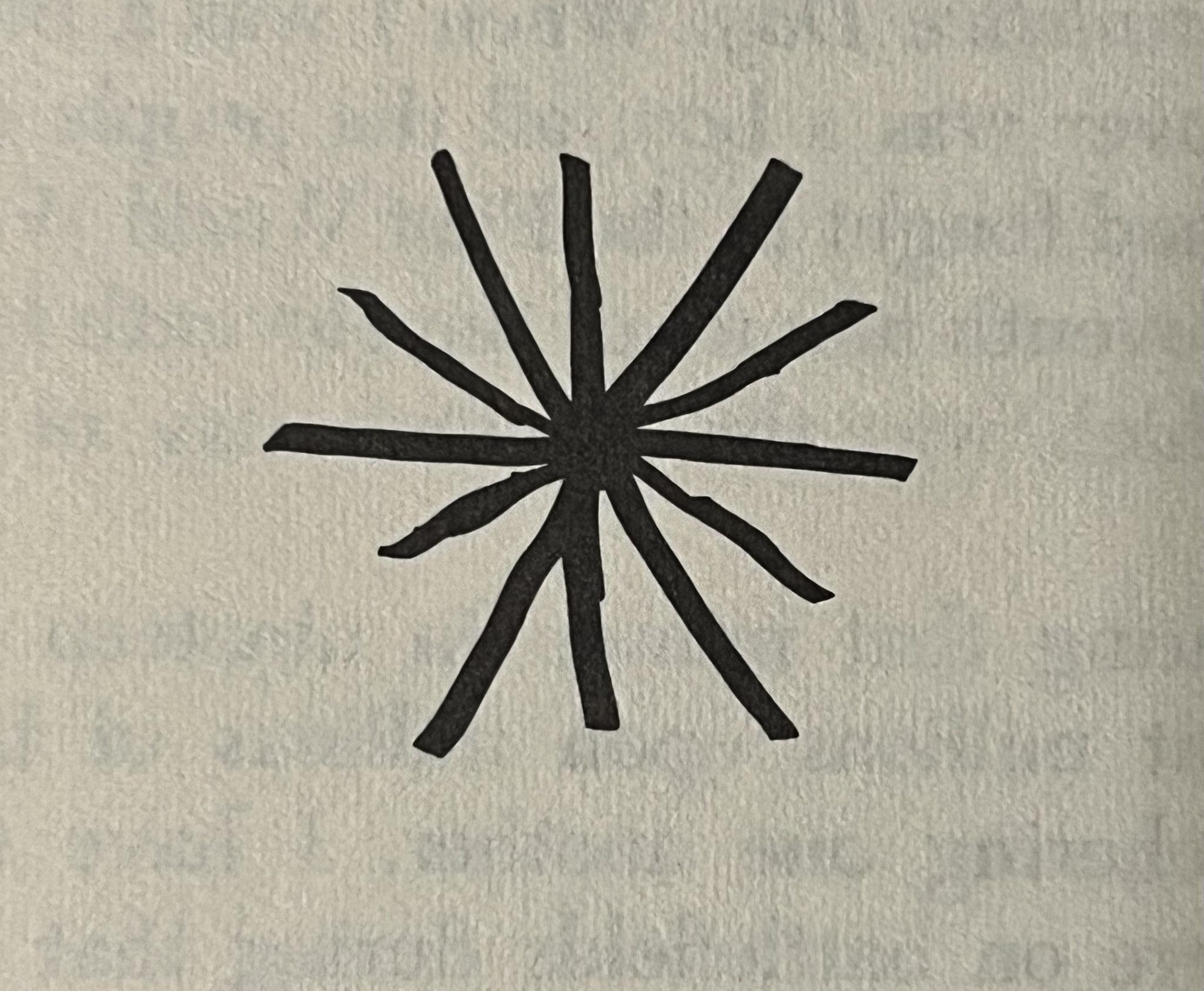how do you even become a former marxist? i feel like i have opened some eldritch tome that cannot be closed. in fact i feel like karl marx himself has fucked me over
There are a few good faith criticisms of Marx to be made, but most of them have been made by Marxists. Once you've read them, it's kind of up to you about whether or not you call yourself a "former Marxist."
The author above made one of them. Unilineal cultural evolution is baggage from 19th century anthropology. The idea of society moving through phases on a single track ignores the ways that many anti-colonial movements grounded their resistance not in capitalist class struggle and communism, but in indigenous social forms which they sought to displace capitalism with. The Zapatistas are a great example.
Another one is the idea that the state is a neutral instrument for class rule which can be weilded by any class. In most of the world, capitalism and the State were imposed simultaneously and resistance often takes the form of alternative political formations. The maroon colonies were a great example as many were egalitarian or built into existing indigenous institutions (although some certainly were states).
My examples here are from black and indigenous people, which I think points to a common thread in legitimate criticisms of Marx: while he acknowledged the struggled of indigenous peoples and women, he centered European city dwellers in his analysis. He argued that they were the main revolutionary subject, but the first Marxist revolution was carried out by peasants.
That's not to say Marxism isn't powerful, only that it's blind-spots need to be accounted for and that what results from that project night reasonably be called "after Marxism"
Or, we could call it by its current names: autonomism, 4th world nationalism, the black radical tradition, 4th wave feminism
The author above made one of them. Unilineal cultural evolution is baggage from 19th century anthropology. The idea of society moving through phases on a single track ignores the ways that many anti-colonial movements grounded their resistance not in capitalist class struggle and communism, but in indigenous social forms which they sought to displace capitalism with. The Zapatistas are a great example.
Most modern Marxists do not believe this for the simple reason most Marxists are from Asia where the track as espoused by Marx is completely inapplicable to past Chinese, Korean, Vietnamese, and Laotian society. For example, none of those societies had a slave economy. They just went from a communal society to a feudal society that lasted for millennia with multiple stages of feudalism. Obviously, the communal society->slave society->feudal society->capitalist society track is only relevant in Western Europe when those East Asian societies' track is more like communal society->feudal society->colonized (semi-colonized for China) semi-feudal society->socialist society. It's not like Chinese/Korean/Vietnamese/Laotian Marxists are purposefully shoehorning the slave society stage to their histories just because some 19th century German dude who never set foot in Asia said so. And it goes without saying that the track Marx described doesn't apply to Cuba either.
In general, most people who are critiquing Marxism in good faith (and everyone who is critiquing Marxism in bad faith) have almost no knowledge of actually existing Marxism ie the Marxism that is studied and practiced in current countries with ruling ML parties. Whether China et al is revisionist or not shouldn't be particularly relevant to critiques of Marxism because the question of whether China is revisionist or not is a question between Marxists, not people who think Marxism is flawed. It makes no sense to cast aside Chinese communists as "not real Marxists" in order to find a different band of Marxists as "real Marxist" only to then critique them and use them as a demonstration of Marxism's inadequacies.
The hilarious thing about all this is Marx himself would agree with you
Here he is in 1877 responding to the same critique and being somewhat baffled that it's being applied to him lmao
Now what application to Russia can my critic make of this historical sketch? Only this: If Russia is tending to become a capitalist nation after the example of the Western European countries, and during the last years she has been taking a lot of trouble in this direction – she will not succeed without having first transformed a good part of her peasants into proletarians; and after that, once taken to the bosom of the capitalist regime, she will experience its pitiless laws like other profane peoples. That is all. But that is not enough for my critic. He feels himself obliged to metamorphose my historical sketch of the genesis of capitalism in Western Europe into an historico-philosophic theory of the marche generale [general path] imposed by fate upon every people, whatever the historic circumstances in which it finds itself, in order that it may ultimately arrive at the form of economy which will ensure, together with the greatest expansion of the productive powers of social labour, the most complete development of man. But I beg his pardon. (He is both honouring and shaming me too much.) Let us take an example.
In several parts of Capital I allude to the fate which overtook the plebeians of ancient Rome. They were originally free peasants, each cultivating his own piece of land on his own account. In the course of Roman history they were expropriated. The same movement which divorced them from their means of production and subsistence involved the formation not only of big landed property but also of big money capital. And so one fine morning there were to be found on the one hand free men, stripped of everything except their labour power, and on the other, in order to exploit this labour, those who held all the acquired wealth in possession. What happened? The Roman proletarians became, not wage labourers but a mob of do-nothings more abject than the former “poor whites” in the southern country of the United States, and alongside of them there developed a mode of production which was not capitalist but dependent upon slavery. Thus events strikingly analogous but taking place in different historic surroundings led to totally different results. By studying each of these forms of evolution separately and then comparing them one can easily find the clue to this phenomenon, but one will never arrive there by the universal passport of a general historico-philosophical theory, the supreme virtue of which consists in being super-historical.
This is why I can't take modern critiques of marxism seriously, 99% of the time they're not applicable or Marx himself would agree with them which begs the question why would it be considered a critique of "Marxism" in the first
The answer is pretty simple, Marxism as defined and elaborated by late-stage Marx is a robust critique and analysis of capitalism that hasn't actually been successfully challenged on its own merits and instead requires a degree of academic slight-of-hand to dismiss, this is enforced on a political basis which is why it's easy for even folks who consider themselves "well-read" on Marx to be completely misled on the subject
I very strongly agree with the points you're making wrt. eurocentrism, and that have been made about progressivist unilineal history but I'd like to add that Korea was absolutely a slave economy. For most of Korea's recorded history 25-40% of the population were slaves.
What do you suppose caused it to diverge so greatly from its neighbors?
I think some of this can be explained away as Marx centered his focus on industrial society. Some of those societies that you mentioned were not industrial to a great degree. Agrarianism can be easily seen through a Marxist lens, and these movements had tons of support throughout history and tended to be protosocialist in their language and means. Industry is just the most world changing thing we've got.
Marx of course underestimated how quickly the old protosocialist rhetoric of agrarianism and similar ideologies could be used to create a Marxist state, but I don't think it was outside the realm of his ideas. I guess the true underestimation is not knowing how rapidly a deindustrialized area could become industrialized with a concerted effort by a communist party, which honestly in places like China and Russia, its astounding how quick things changed, it'd probably blow Marx's socks off.
I'd question if "protosocialist" is necessarily the word, I think it concedes Marx's unilinealism. Instead, I'd ask how different constituencies build different revolutionary political formations. Like, the Zapatistas adapted Maoism and eventually decided they'd moved beyond Marxism. The political formation the Zapatistas built uses far more high touch decision-making than any state, despite acting as an organ for exercising class power the same way the state is used in China (where decision-making is far lower touch).
You're giving the author too much credit, lol. Your example criticism is more valid and coherent than everything they wrote.
Unilineal cultural evolution is pretty much only very early Marx and even then it was more a leftover of Marx's formal German education then a genuine developing mode of analysis from him, instead it manifested pretty much solely as a political reaction from Marx over the reactionary responses of peasant movements all over Europe post-1848, Marx did not see the revolutionary peasant movements of the 20th century, he saw the monarchies of Europe using peasant isolation and reactionism for their own benefit and concluded, semi-rightly in my opinion that peasants at least in Eastern Europe and Central Europe were not reliable, of course this take is fully bound in the time period and is not, unlike what some miseducated Marxian dogmatists or anti-marxists hold, a central pillar of Marxist analysis
It's completely absent in late Marx and honestly academic critics only bring it up because it's easy to misconstrue without the geopolitical context of what Marx was writing about
Here I found it, Marx in 1877 completely rejects it as a mode of analysis
In several parts of Capital I allude to the fate which overtook the plebeians of ancient Rome. They were originally free peasants, each cultivating his own piece of land on his own account. In the course of Roman history they were expropriated. The same movement which divorced them from their means of production and subsistence involved the formation not only of big landed property but also of big money capital. And so one fine morning there were to be found on the one hand free men, stripped of everything except their labour power, and on the other, in order to exploit this labour, those who held all the acquired wealth in possession. What happened? The Roman proletarians became, not wage labourers but a mob of do-nothings more abject than the former “poor whites” in the southern country of the United States, and alongside of them there developed a mode of production which was not capitalist but dependent upon slavery. Thus events strikingly analogous but taking place in different historic surroundings led to totally different results. By studying each of these forms of evolution separately and then comparing them one can easily find the clue to this phenomenon, but one will never arrive there by the universal passport of a general historico-philosophical theory, the supreme virtue of which consists in being super-historical.
Literal same baseless critiques for 150 years
Another one is the idea that the state is a neutral instrument for class rule which can be weilded by any class
That's definitely not a late-stage Marx belief because he pretty harshly critiques this idea in the Gotha Program
An important fact to remember:
-
Most people that call themselves Marxist have never read Capital.
-
Most self-proclaimed Marxists that have read Capital have never gone past Volume 1, nor have actually tried to figure out the parts that didn't make sense to them.
-
Most self-proclaimed Marxists that have read any of Capital Volume 1 didn't finish it.
Basically... unless you got one of those degrees in Marxism in a cool country, talk of being "Marxist" is cheap. This author sounds like someone that skimmed the Wikipedia article on Marx and thought, "yeah okay cool" and never dived deeper.
Being a marxist is when you reply to byyourlogic and zei_squirrel
It's slightly disturbing to me that having read Capital through about half of volume 2 seemingly makes me more well read than like 90% of Marxists (on the internet at least), because I genuinely don't know what I'm talking about half the time lol
Yeah it's kind of amazing. In the abstract sense it doesn't bother me, I'm fine with Marxist thought resonating with people even if they don't quite "get" the core of what Marx actually wrote.
But then folks decide they get to have critical opinions, either towards Marx or based on some misapplication of Marx, and then they're annoying and can do harm. I've met "Marxists" that fall for the reactionary trope of "real workers" (blue collar, hard hat, etc) vs. everyone else. Like... just don't share your opinions until reading the stuff you imply you did, bro. Also, amazingly, I've run into entire self-proclaimed "Marxist" parties whose reading lists contain neither Marx nor summaries of his work. I shouldn't be surprised, then, that those parties spend most of their efforts on party building but can't create coherent messaging.
I haven't read marx's capital, but i've got the marks of capital all over my back
or something along those lines
i don't expect the average worker to read capital, but yeah as @AHopeOnceMore@hexbear.net said it should at least be a prerequisite to making strong criticisms of marxian theory.
everyone should at least try to understand the basic concepts though, understanding the mechanisms of capitalism is essential to fighting it.
 "I've never read Marx's Capital, but I've got the marks of capital all over my body."
"I've never read Marx's Capital, but I've got the marks of capital all over my body."atleast we both understand that shit is fucked and that capitalism isnt going to fix it
should really read capital though

-
like for real. how can you think marx is wrong? even the clintons and the most evil neoliberals think marx is right and try to do their best to subvert marxist theory and organization as described in order to extend their time in the sun
they know that unions are how we get our in in a industrial society and have been hammering them for decades
The author is incompetent and kind of makes me wonder whether they ever read Capital.
An easy example is this: "Marx regarded the working class as the only potentially revolutionary class—but, in fact, history shows that revolutions can be started by any disgruntled group."
Marx definitely never claimed that the working class is the only one capable of any revolutions, anywhere, any time. The author points at revolutions in 17th century England as examples. Amazing. Wars exemplifying obvious, if nascent, bourgeois interests vs. feudal interests. Marx wrote about exactly those things. He critiqued the American system on similar grounds, along with its civil war. What Marx did say is that under the domination of the capitalist system, it is the working class that has class consciousness forced on it, and also the means to force dramatic change through their place as laborers, to carry out lasting revolution and depose the bourgeois class. Outside of a capitalist context, the working class barely even exists, historically, and of course Marx wrote about this a lot. Amateurish errors.
The author also cites just a couple authors, snd oddly. Like... some citatiobs are just links to books costing hundreds of dollars with no page referencr or even an explanation of how the book does what the author implies, like debunking this or that thing Marx said (being generous that they even got that right). It's pretty clear they just like a couple authors' opinions a lot, particularly Vivek Chibber's.
The author also falls onto some pointless tropes about what Marx did or didn't foresee, with the implication that for Marxism to be legitimate, Marx should've predicted, say, the welfare state. Of course, Marx talked about the initial makings of welfare states in the 1800s, but let's pretend he didn't. Why is he on the hook for this? Is there a difference between Marxism and everything Marx ever said, did, predicted, or failed to do? The author implicitlu equates all of these things and doesn't explain or elaborate.
Finally, they're disorganized. The article jumps from point to point like a middle grader writing a book report. Claims that require explanation and justification are just left there. The task they set out to do requires more coherence, thought, and space than they allowed themselves.
It's as if they don't know what they're doing.
An easy example is this: "Marx regarded the working class as the only potentially revolutionary class—but, in fact, history shows that revolutions can be started by any disgruntled group."
Yes, this shows that they didn't even read the communist manifest "The history of all hitherto existing society is the history of class struggle", which in the text makes clear what you wrote long and broad, that it is fundamental to understanding of Marxist, Engelian and plenty of Hegelian thought there are various revolutionary subjects. It just depends on the material conditions (and a few more things).
A valid critique could be phrased as:
The revolutionary subject which Marx saw as the proletariat (and even in its permissive form as the working class) isn't, as developments in the adaption of capitalism, digital surveillance, the union of authoritarian power and free markets (alá Zizek in regards to China) showed capitalism is able to reign in the working class. The only revolutions that happened came from groups better described as XYZ.
However it would be wrong. For two reasons, I'd like to mention, the first is that Marx makes clear that a coup which merely changes who reigns but leaves the system in tact is merely half a revolution, it achieves the change of rulers from one to another group, but the contradictions and forces of capitalism (that for example destroy the planet) remain in force. It isn't a revolution in the Marxian sense.
The other is that even if there are other revolutionary groups which are "disgruntled" and can coup or revolt I would like to see specific examples and in most cases these disgruntled groups aren't revolutionary, in exceptions they are but in those exceptions they are unable to achieve a revolution against capitalism itself, even if they manage to do anti colonial revolutions - for example.
Yes, of course.
I think I was too generous towards the author, actually. I shouldn't assume they've read anything they cited. They don't demonstrate substantial knowledge of it and made "baby's first anticommunisn"-style errors on Marx, like equivocating on what exploitation means in the Marxist sense.
Yeah, there is a difference between a general coup or revolt -- which may represent nothing but power changing hands by force -- and a revolution -- which changes nearly the whole of society in its impact on relations of production.
Yes! It read like a creationist critiquing Darwin for not knowing the base pairs of DNA.
Vivek Chibber
You made this name up. I refuse to believe there is an academic with this name.
"These comments suck, look at these much better comments"
thanks for the publicity, idiot
"These comments suck, look at these much better comments"
A browser extension that replaces the comments section of every major website with the comments sections created by Hexbear whenever a page URL matches.

Broke:
 Comments for Youtube Extension
Comments for Youtube ExtensionWoke:
 Comments for Youtube Extension
Comments for Youtube Extension
no no no please make accounts. I'm desperate for slop. I'm a lowly hog and I'm starving.
Oh please send your finest chuds here to debate, it's been so long since the sub and our hog reserves need replenished
On the one hand [the kind of explanation of dialectics you might give to a middle school student] (there is never another hand)
I love how often these "criticisms" of dialectics are clearly just "idk, seemed complicated so I didn't bother actually reading about it"
What's your favorite part?
-
Workers following muh "rational best interest" are the barrier to collective action (Marx failed to consider that employers could simply pay scabs more), not the "semi-conspiratorial, quasi-Freudian" concept of false consciousness
-
Crusaders weren't motivated by wealth and land because in practice they often lost money. Instead, they were motivated by a shift in Christianity towards militarism which was apparently completely random and unrelated to anyone's material interests.
-
Marx's theories of exploitation weren't empirically grounded. By contrast, neoliberal economists have proven that workers are only a little bit exploited, by comparing how much they're currently paid with how much they might get paid at a different position in the exact same economy (which is really their call so it's not really exploitation anyway).
Honestly that last one was wild. It feels like a magician's slight of hand more than anything. When you actually stop to look at it, like, obviously when Marx was talking about exploitation, he was talking about it on a systemic level, not as something that could be overcome by working for a different employer. But the way the author writes it you could almost miss that that's he's shifting the meaning like that.
-
Damn lol its so fucking easy writing anti-marxist rants to get published online, every single quote is babys first marx refutation.
the actual content doesn't matter, it's the repetition that convinces people - especially those unwilling to do research.
“Key institutions and features—such as democracy, the rule of law and civil and interstate peace—can only emerge under capitalism and are always absent from pre-capitalist societies. This is because, under capitalism, the ruling class has no need to resort to violence to amass money, while, in a feudal society, the rulers maintain their power and wealth through unequal laws, aristocratic privileges and constant territorial incursions. Capitalist elites don’t need to do this: they can let the impersonal forces of the market do the work for them.”
Thanks for that quote, which is so wrong in so many levels and ahistorical it would take hours to go through every single misdirection it tries to do. In addition the write up you do is well done :)
That said the linked article reads like black propaganda
They also are going full "crab-bucket" mode, Thatcher and Ayn Rand would be proud:
Marx also underestimated the problem of free riding among the working class and instead wrongly attributed working-class division and passivity to false consciousness (a semi-conspiratorial, quasi-Freudian notion). In fact, as Mancur Olson has argued in The Logic of Collective Action, under normal circumstances, workers have no compelling reason to take part in a revolution. The chances of an individual worker tilting the scales are extremely small. The revolution will succeed or fail regardless of what she, personally, decides to do. So, she’s better off simply staying on the sidelines and not risking getting arrested or killed. If the revolution succeeds, she’ll still enjoy its benefits, if any—say, expanded democratic rights or the abolition of exploitation—even if she didn’t participate in it
Though didn't we see from the evil Soviet Union that people who didn't partake in the revolution did better, but also worse after? Revolution is not a single turn prisoner dilemma, it is a no prisoner multi stage game, which means that people are aware of what you did.
However from organizing we know that "The Logic of Collective Action" isn't that one worker doesn't tip the scales, it is that workers are path diagrams, every worker influences the conditions and some will create non linear effects, especially after a tipping point. This means that during collective action and revolution the impact of single people can be exceptional. The econ "we linearize everything" and look at things as static dogma once again ruined the point the author (and his source) could've made.
Assuming most workers are rational, one would expect large-scale revolutionary collective action to be an uncommon phenomenon: no “false consciousness” is necessary to explain this.
Or the author is just
 and not as rational and intelligent as he thinks. "Rational" in the sense he uses is also the propaganda term for econ bros who didn't take the time to think stuff through a tenth as much as
and not as rational and intelligent as he thinks. "Rational" in the sense he uses is also the propaganda term for econ bros who didn't take the time to think stuff through a tenth as much as  did.
did.It gets even worse:
But supply and demand are themselves directly determined by people’s personal wants and preferences, as expressed through their purchasing decisions
Yeah, critiquing Marx with a smudged electron microscope and using econ 101 theory blindfolded and gagged.
I would like to add another point. The author writes about "empirical evidence" which shows that it is wrong to say that the "rate of profit falls" and what do they do? They cite the same old graphs about how in the US and a selection of imperial markets the profit rate didn't fall as hard and that it does fluctuate around a bit. Nothing which disproves the rate of profits to fall.
That is a topic I am quite interested in and people then turn around and act as if (a) it is enough to look into your own back yard and claim that it doesn't happen and (b) that companies aren't explicitly trying to deal with that problem. That is one of the reasons Thiel, Musk, Bezos, and others try to get monopolies or quasi-monopolies in their markets and why companies (market failure in econ 400 and 300) try to create oligopoles and not go into price battles (gas stations and raffineries come to mind) rather often.
IP rights are also a way to enforce a longer time of reaping profits till others are allowed to use the advancements - even if they did come up with it on their own. In addition IP rights are market entry barriers which reduce the competitiveness in a market from a non-Marxist outlook, too.
It's beside the point but it blows me away that people blame WW1 so unilaterally on Germany still.
Edit: were the Crusades not motivated by levels of fealty and the geopolitical desires of the ruling class? What "motivated" the soldiers seems to be besides the point, and pinning it on religion as though religion unilateraterally motivates anything seems even more silly.
Well, I guess the Children's Crusade, but I mean the ones that weren't exclusively child abuse.
revolutionary upheavals carried out by the dominated classes (such as the bourgeoisie under feudalism and the proletariat under capitalism)
Former Marxist huh
An article that makes broad statements and sweeping conclusions while waving 'evidence' in the form of opaquely cited essays that draw zero material from them to illustrate what evidence is being utilized, it is without rigorous intellectual work in expounding the thought process that lead the author to his conclusion. Doesn't cite Lenin when talking about Lenin's analysis of WW1, doesn't cite the economic formulas used my Marx when discussing Marx's economic analysis and how it's debunked i.e the author's statement saying Marx's work analyzing the tendency of the falling rate of Profits - something that marx and later engels rigorously explains the math for - is completely debunked because of a a few graphs that literally illustrates how Capital's crisis caused by the falling rates of profits causes it to cannibalize itself until it can return to profitability. He even does the meme of saying workers are perfectly free to sign a legal work contract in a capitalist economy where the only alternative to that is that you're free to starve like a dog. The more I keep reading this the more I'm getting pissed off, he even talks about how supply and demand are things purely controlled by individuals wants and needs and not based off of monopoly capital in it's sole drive to increase profits will shape the supply and demand of the market as it sees fit by either cutting back supply when there is too much surplus in order to increase profits by increasing scarcity and inversely increasing production when the scarcity is high enough for record profits to be made meeting it until that cycle starts over.
i'm gonna stop reading this before i get too mad to sleep
oh yeah, you can vote in the comment section folks, take the opportunity to bully this nerd
Areo is an Intellectual Dark Web space, that's why.
Use their free speech to fuck their shit up.
Isn't it amazing how consumer trends are just people changing their mind spontaneously, all at once? Makes you wonder why companies spend so much in advertising.
Speaking of, it is a good thing TVs were invented when they were, because otherwise who knows what the aetheric trend of buying TVs would have manifested as. No, the trend was not instigated at all by a change in supply.
In the comments, the author also said, "There was no revolutionary capitalist bourgeoisie in 1789 in France."
Wow. So I guess bankers and lawyers did not play a big role in the French Revolution?
there's been a big movement since like the 60s among anglo revisionist historians to re-evaluate the french revolution as not being a bourgeois revolution. it coincides with the postmodern/neoliberal domination of academia, the purging of anything vaguely marxist.
but yeah there's a plethora of evidence showing the french revolution was (largely) bourgeois, that an emerging bourgeoisie class existed prior to the french revolution. the revisionists base their rejection/ignorance of such on the lack of a clear bourgeois class-consciousness that differentiates it from other elites. but that's a misconception that conflates a lack of common signifiers (like the word bourgeois meaning specifically capitalist at the time, rather than simply meaning elite) for a lack of commonly-accepted concepts of a newly-emerging class centered around profit-seeking rather than rent-seeking. "Misconception" is too forgiving a word for some of the revisionists, who seem to deliberately avoid engaging with theorists from the period who clearly talk about a new "middle" class whose material interests clashed with the landed aristocracy.
also some of them argue that because there were still feudal characteristics-- economically, politically, and culturally-- that persisted before during and after the revolution, that disproves its primarily bourgeois nature. but that's a childish understanding of how the world works, of course there's gonna be vestiges and holdouts. of course people aren't going to instantly conjure agreed-upon words to signify newly-emerging phenomena, they're going to struggle to use the language of the old system to rationalize and understand the new.
the worst of them are the ones claiming the french revolution was simply a bunch of people got radical ideas in their heads and decided to overthrow the govt. treat it almost as a cautionary tale against getting too radical lmao. i doubt i have to explain the problems with this degree of idealism to anyone on this forum.
Marx’s concept of “surplus value” implies that workers are always necessarily being exploited even if they freely sign a legal contract with an employer under competitive conditions (since the cost of their wages is always less than the profits they allow the company to make). This is simply wrong.
Oh? Mind explaining why?
It’s not that workers are never exploited under capitalism; they just aren’t always exploited. [paragraph ends]
hm. he picks this back up a few paragraphs latter:
Some contemporary Marxists admit that Marx’s classical theories are mostly mistaken, but propose that we rework them, extracting what is useful and discarding the rest. For instance, we could abandon the notion of surplus value, while still holding onto the idea that workers are exploited under capitalism. Contemporary Marxists, such as Erik Olin Wright and Vivek Chibber, deduce this from the fact that there is an asymmetric relationship between relatively powerless individual workers and powerful individual capitalists.
Still doesn't explain why the idea of surplus value should be abandoned.
This reads like someone with a second-hand understanding of Marx criticizing simplified versions of Marxist ideas. I... can't say if that's actually the case or not as... I only have a second-hand understanding of Marx. It's not limited to surplus value, it kinda extends through the whole piece. You get the sense the author isn't being particularly generous to the ideas they're supposedly deconstructing.
The author doesn't know that exploitation is the extraction or surplus value, is lying, or is so confused that they sometimes know it and sometimes don't. For example, they mention that employers keep the difference between profit and what they pay the workers (not correct but at least it's in the ballpark), then a bit later imply exploitation doesn't exist if you can't get paid more to work the same job at a different company (not remotely what exploitation is about, lol).
With such basic errors you get to play the game of, "is this person honestly confused or entirely full of shit?" As they are a professor, it's the latter. They know better, which is why they're publishing a poorly-citing, incoherent, and simply incorrect ramble on some rag frequented by the lazy and ignorant rather than in any space that would be read by academics. They know exactly what they are supposed to do when writing a critique so thay it at least makes sense at a basic level and then decided not to, because their audience won't give a shit - the audience won't have read Marx, but will be happy to reject Marxism - an amorphous enemy blob of a concept, to them.
So... the remaining categorization is: hack or fraud? A hack is just bad at what they do and is treading water with shoddy work to stay in their position. But they also have an ego and think they're fighting the good fight and are doing a good job. A fraud is fully aware that they are full of shit and schemes about how to pull one over on their targets. They are very insecure and tend to lash out at others to keep the presumption of their expertise secure.
My vote is for hack. Their overreliance on pointing vaguely at Vivek Chibber feels like someone who really does think they're correct but is just lazy as shit and doesn't want to have to actually read, understand, or explain anything.
I’m just curious how they would reply to critiques because something tells me they wouldn’t be charitable. I personally think it’s silly to treat Marx as some sort of prophet and invalidate his entire framework because he wasn’t clairvoyant

That writer is fucking dumb as shit.
I just finished the article and it’s bad.
more importantly, Marx’s assumption that labour is the only source of economic value has been completely rejected by almost all mainstream economists.
Hmmmm wonder why
Or perhaps you’re interested in why World War 1 started. The Marxist formula suggests that the war might have begun as an attempt to further the interests of German businessmen, who had close links with leading politicians, through a landgrab by a rising imperial power.
Wish I had more historical knowledge, but the extent of my western neolib education regarding world war 1 is “Archduke Franz Ferdinand was assassinated. However I’m almost certain that there were more material forces at play though and have heard it’s a war whose causes are still debated
a more macro analysis would be that austria-hungary, russia, and the ottoman empire treated the majority of their populations as slaves (as feudal monarchies tend to do), and certain ethnic groups as less-than-slaves, and that was just gonna end up exploding at some point, and that occurring would cause the present system of european capitalism and its supply chains to come to a halt, creating the need for war, expansion, and the creation of new supply lines in order to stabilize capitalism.
A teenager was hungry. Shot the duke. Caused a world war. Crested Hitler. Simple


















